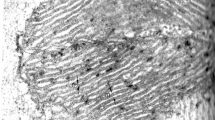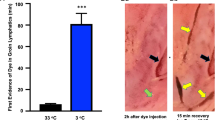Abstract
IN continuation of our earlier work on lipases1, we have followed the changes in the lipase content of different organs of guinea pigs infected with bovine tuberculosis. Lipase determinations were made from liver, pancreas, lungs and, blood serum, using tributyrine as substrate. It appeared that, coincident with the development of tuberculosis, the lipolytic activity of liver, pancreas and of blood serum is considerably lowered. The results are given in the following table.
This is a preview of subscription content, access via your institution
Access options
Subscribe to this journal
Receive 51 print issues and online access
$199.00 per year
only $3.90 per issue
Buy this article
- Purchase on Springer Link
- Instant access to full article PDF
Prices may be subject to local taxes which are calculated during checkout
Similar content being viewed by others
References
Acta Chemica Fennica, B, 5, 28; 1932. Z. physiol. Chem., 219, 1; 1933.
Author information
Authors and Affiliations
Rights and permissions
About this article
Cite this article
VIRTANEN, A., SUOMALAINEN, P. Changes in the Lipolytic Activity of Different Organs during Tuberculosis. Nature 133, 532–533 (1934). https://doi.org/10.1038/133532b0
Issue Date:
DOI: https://doi.org/10.1038/133532b0
This article is cited by
-
Die Lipoide des Tuberkelbacillus und ihre Bedeutung für therapeutische Möglichkeiten
Zeitschrift für Hygiene und Infektionskrankheiten (1953)
Comments
By submitting a comment you agree to abide by our Terms and Community Guidelines. If you find something abusive or that does not comply with our terms or guidelines please flag it as inappropriate.



